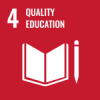Three provinces are open to UGM students who will conduct Students Community Service-Community Empowerment Learning (SCS-CEL). The Head of West Kalimantan Province Bappeda, Yuslinda, Central Sulawesi Bappeda, Moh. Faizal Mang., and Secretary of the North Sumatra Bappeda, Yoppi Sukmono, conveyed their willingness at the Partnership Strengthening Workshop to Support the Development of Themes and Locations for UGM SCS-CEL, which was held online on Friday (4/9).
Hopefully, the workshop can congregate input of innovations and new ideas which are beneficial for implementing UGM SCS-CEL in the future. By involving the local governments of West Kalimantan, Central Sulawesi, and North Sumatra, they can draw a detailed picture of the three regions’ problems and development plans.
Head of West Kalimantan Province Bappeda, Yuslinda, hopes that UGM students will continue to conduct student community service in West Kalimantan. With an area of 146,807 km2 or 7.53 percent of Indonesia’s areas or 1.13 times from Java, West Kalimantan has very complex development problems.
“This region strains straight from north to south for more than 600 km and about 850 km from west to east. Another precise characteristic is that the West Kalimantan region is one of Indonesia’s provinces that directly border with a foreign country, namely the Sarawak State, East Malaysia,” he said.
With a population of 5.4 million, having 12 districts/cities and 174 sub-districts, 2031 and 257 islands, the strategic issues and problems that West Kalimantan still faces at a macro level are relatively high poverty rates. Among them, eight districts are in underdeveloped condition, 14 are in border areas, and the HDI rate is relatively low.
“The national-level status is in 29th position, still below the national average. Therefore, realizing people’s welfare through infrastructure development is a development priority. Moreover, due to corona, there was an economic recession of 3.4 percent. Economic growth was obstructed, many people lost their jobs, the rest were poor and unemployed. Therefore, the development direction of 2021 accelerates economic recovery due to the Covid-19 pandemic, namely supporting national development, reducing poverty, and lower HDI rate with a focus on development on villages,” he said.
Central Sulawesi Bappeda, Moh. Faisal Mang., stated that there would be synergy between local governments and universities with SCS-CEL, both State Universities and Private Universities. With Student Community Service, there will be a mutually beneficial connection between the two parties.
“Universities transfer technology, research results, and innovations, while universities with Student Community Service will adapt to regulations made by local governments, and there will be an exchange of development data and information,” he explained.
Faisal Mang said that according to the authority of decentralization, the regional government prepared a program by making policies to manage the region, namely by planning based on human-oriented development centers. Meantime, universities with Tri Dharma apply skill learning technology and social learning in the community.
“Student Community Service is also based on people-centered development; there is a synergy between the local government and PT at this stage. Furthermore, local community empowerment is carried out jointly by utilizing existing resources to make local communities more empowered,” he explained.
According to him, empowering the community can be embodied in education, social, psychology, and politics to produce people who have substantial power to reduce poverty. Also, it can create a suitable living environment, a high human development index, and increase community participation to develop independent villages and prosperity.
“This kind of role is our hope for Student Community Service. Therefore, the regional government of Central Sulawesi is very amenable to facilitate locations for the UGM SCS-CEL. We will facilitate licensing for the implementation of the community service in Central Sulawesi. We will also welcome the output, the output of smart applications from the UGM SCS-CEL for planning and development in the Central Sulawesi region,” he explained.
Secretary of the North Sumatra Bappeda, Yoppi Sukmono, conveyed the same hope. He hopes UGM students can proceed to carry out SCS-CEL in North Sumatra to assist local governments in building villages and managing cities.
According to him, the economic conditions of North Sumatra before the pandemic grew well, being above the national average until 2019. But in the last second quarter, the national contraction was minus 5 percent and North Sumatra minus 2.7 percent.
“We are the most extensive province on the island of Sumatra. Forestry, agriculture, and fisheries are the most significant contributors to economic growth, followed by the processing industry and trade. Of the 17 sectors, sectors that continue to grow positively are agriculture, food crops, and horticulture,” he said.
Source: https://www.ugm.ac.id/id/berita/20014-tiga-provinsi-terus-membuka-diri-untuk-lokasi-kkn



